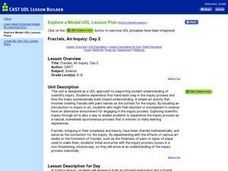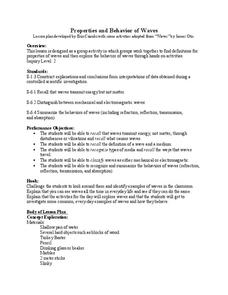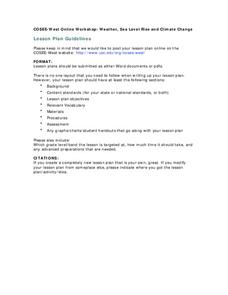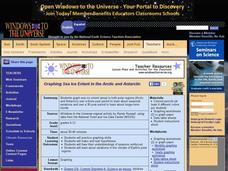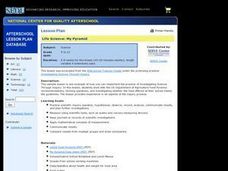Curated OER
Chain Reaction
Learners study animal behavior and how it changes to its environment. In this animal lesson students design and conduct experiments.
Curated OER
Gravity, Angles, and Measurement
Students relate math to real life scenarios. In this geometry lesson, students launch a ball tracking each launch using a graph. They analyze their data for speed, angles and distance, trying to improve on each launch.
Curated OER
Designing an Underwater Habitat for Humans
Students consider the limitations of deep water oceanography and design an underwater habitat to support scientists while they complete long term studies under the ocean. In this engineering activity, students are introduced to the...
Curated OER
Population Biology Case Study
Students are focused on the big question: What makes a population grow and how could that growth stop? They use these concepts to help answer the big question: carry capacity, density dependent v. density, independent factors, predation...
Curated OER
Physical Science- Sink or Float?
Learners investigate which objects sink and which ones float. Learners engage in an experiment, make predictions, and record results on a graphic organizer. This is a comprehensive and easy to follow resource.
Orange County Water Atlas
Location, Location, Location…
Young geographers discover not only how to read and recognize coordinates on a map, but also gain a deeper understanding of latitude and longitude and how climate changes can vary significantly across latitudes.
NOAA
Ocean Layers I
How is it possible for ocean water to have layers? The sixth installment of a 23-part NOAA Enrichment in Marine sciences and Oceanography (NEMO) program investigates factors that cause different water densities to occur. Experiments...
American Chemical Society
Isolation of Phytochrome
Why do soybean plants that are planted weeks apart in the spring mature simultaneously in the fall? Four independent activities cover the history of phytochrome research, scientist collaboration, the electromagnetic spectrum, and...
PHET
Measuring the Interplanetary Magnetic Field
Scientists need to figure out how to measure interplanetary magnetic fields, but the magnetic field of the spacecraft is interfering with their readings. Scholars attempt to solve the problem that has perplexed NASA scientists for years.
NASA
Things Are Not Always What They Seem
Science is magic that works. Magical color-changing beads and a coffee can that follows voice commands are just two examples of magic tricks that rely on science. After completing a hands-on activity and an experiment investigating the...
Foundation for Water & Energy Education
How is Flowing Water an Energy Source? Activity B
Explore the world's water without leaving the classroom! In this second of three uncomplicated but wonderful activities, physical science learners feel the pressure of water. They discover that the deeper the water, the stronger the...
Curated OER
MAISA and the REMC Association of Michigan
Students complete online research to study geography's impact on weather. In this geography and weather lesson, students research weather in their city for ten days using an online website. Students bookmark the site, enter data into a...
Curated OER
Galaxies
The first thing to note is that this lesson was written for use in a parochial school. Even if you are in a non-religious setting, however, the website exploration of galaxies and the accompanying worksheet make for an engaging...
Curated OER
Fractals, An Inquiry
Middle schoolers observe and discuss several different fractal drawings and relate them to patterns they see in nature. They use an online fractal tool to create and modify a fractal image and then create their own fractal image with...
Curated OER
Antacid Lesson Plan
Eleventh graders use titration methods to study properties of antacids. They look at the strength, effectiveness, PH, and effect of supplements taken at the same time. They make observations after the different mixtures are combined and...
Curated OER
Fertilized Death Water
Students investigate the effect of chemicals on Platyhelminthes and planaria development. They observe the growth and development of planaria and investigate what fertilizer can do to living organisms when it is introduced into their...
Curated OER
Seeds and Similarities
Young scholars use the scientific inquiry method to identify the changes in a plant's life cycle. In groups, they plant different types of plants and use a chart to compare and contrast their growth rates. They share their conclusions...
Curated OER
Illinois' Habitats Happening
High schoolers use the scientific inquiry method to examine the ecosystems and biomes in Illinois. Using the characteristics of a local habitat, they identify the best conditions for an ecosystem to survive and how a slight change can...
Curated OER
Properties and Behavior of Waves
Young scholars explore the different properties of waves. In this physics lesson, students differentiate mechanical and electromagnetic waves. They explore each lab station and write their observation about the wave behavior they see.
Curated OER
What Sticks Can Make You Sick
Students study adhesins and their receptors. In this science inquiry lesson students experiment to find adherence and use agglutination to identify adhesins.
Curated OER
Exercise and Heartrate
Fourth graders experiment to find the effects of exercise on the heart rate. In this exercise and heart rate lesson, 4th graders create questions about exercise and heart rate. Students use the scientific method to test and analyze...
Curated OER
Weather, Sea Level Rise and Climate Change
Eighth graders compare and contrast weather and climate. In this earth science lesson, 8th graders research weather data site and analyze historical data. They present their findings in class and explain identifiable trends.
Curated OER
Graphing Sea Ice Extent in the Arctic and Antarctic
Students graph sea ice data and predict long term trends in the data. In this climate change lesson, students use sea ice data from the Arctic and Antarctic to construct line graphs. They use their graphs to predict the effects of global...
Curated OER
Life Science: My Pyramid
Students examine how the school food program compares to the food pyramid recommendations. In this food pyramid lesson plan, students compile data regarding the food choices available in the school through the lunch program and vending...















